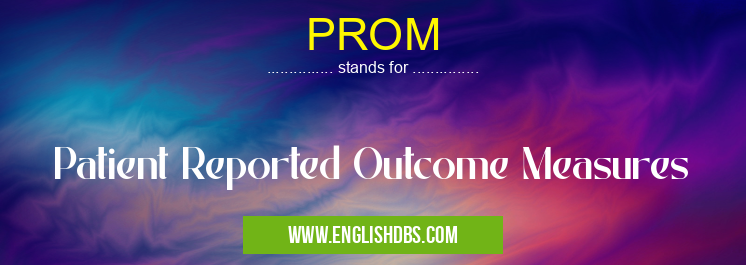What does PROM mean in ADVISORY
PROM is an abbreviation that stands for Patient Reported Outcome Measures. These measures are used in healthcare to assess the patient's perspective on their health and well-being. PROMs can be used to track progress over time, compare different treatments, and identify areas where improvements can be made.

PROM meaning in Advisory in Business
PROM mostly used in an acronym Advisory in Category Business that means Patient Reported Outcome Measures
Shorthand: PROM,
Full Form: Patient Reported Outcome Measures
For more information of "Patient Reported Outcome Measures", see the section below.
Introduction: Patient Reported Outcome Measures (PROM)
Types of PROMs
There are many different types of PROMs, each designed to measure a specific aspect of the patient's experience. Some common types of PROMs include:
- Symptom severity scales: These scales measure the intensity or frequency of symptoms, such as pain, fatigue, or nausea.
- Functional status scales: These scales measure the patient's ability to perform everyday activities, such as walking, dressing, or bathing.
- Health-related quality of life scales: These scales measure the patient's overall quality of life, including their physical, mental, and emotional well-being.
Benefits of using PROMs
PROMs can provide a number of benefits for patients and healthcare providers. For patients, PROMs can help them to:
- Track their progress over time
- Compare different treatments
- Identify areas where improvements can be made
- Communicate their needs to their healthcare providers
For healthcare providers, PROMs can help them to:
- Track the effectiveness of their treatments
- Identify patients who are at risk of developing complications
- Improve the quality of care they provide
Essential Questions and Answers on Patient Reported Outcome Measures in "BUSINESS»ADVISORY"
What are Patient Reported Outcome Measures (PROMs)?
Patient Reported Outcome Measures (PROMs) are standardized, self-reported questionnaires that assess patients' perspectives on their health and well-being, including symptoms, functional status, and quality of life. They provide valuable insights into the patient experience that complement traditional clinical assessments.
How are PROMs used?
PROMs are used in various healthcare settings to:
- Track and monitor patient progress over time.
- Inform treatment decisions and patient management.
- Assess the effectiveness of interventions and therapies.
- Compare outcomes between different providers, clinics, and healthcare systems.
What types of PROMs are there?
PROMs cover a wide range of health conditions and aspects of well-being, including:
- Pain and physical functioning
- Mental health and emotional well-being
- Health-related quality of life
- Self-management skills and coping mechanisms
How are PROMs collected?
PROMs are typically administered as questionnaires that patients complete themselves. They can be administered in person, online, or through mobile devices. Patients provide their responses anonymously or semi-anonymously to ensure confidentiality.
Are PROMs reliable and valid?
High-quality PROMs undergo rigorous development and validation processes to ensure their reliability and validity. They are based on sound psychometric principles and have been shown to provide consistent and meaningful information.
How are PROMs data analyzed and interpreted?
PROMs data are typically analyzed using statistical methods to summarize patient responses, track changes over time, and compare outcomes between groups. Scores can be interpreted according to established norms or benchmarks.
What are the benefits of using PROMs?
PROMs enhance patient-centered care by:
- Empowering patients to actively participate in their healthcare.
- Providing a comprehensive understanding of patient experiences.
- Improving communication between patients and healthcare providers.
- Facilitating evidence-based decision-making.
Final Words: PROMs are an important tool for assessing the patient's perspective on their health and well-being. They can be used to track progress over time, compare different treatments, and identify areas where improvements can be made. PROMs can benefit both patients and healthcare providers by providing valuable information that can be used to improve the quality of care.
PROM also stands for: |
|
| All stands for PROM |
